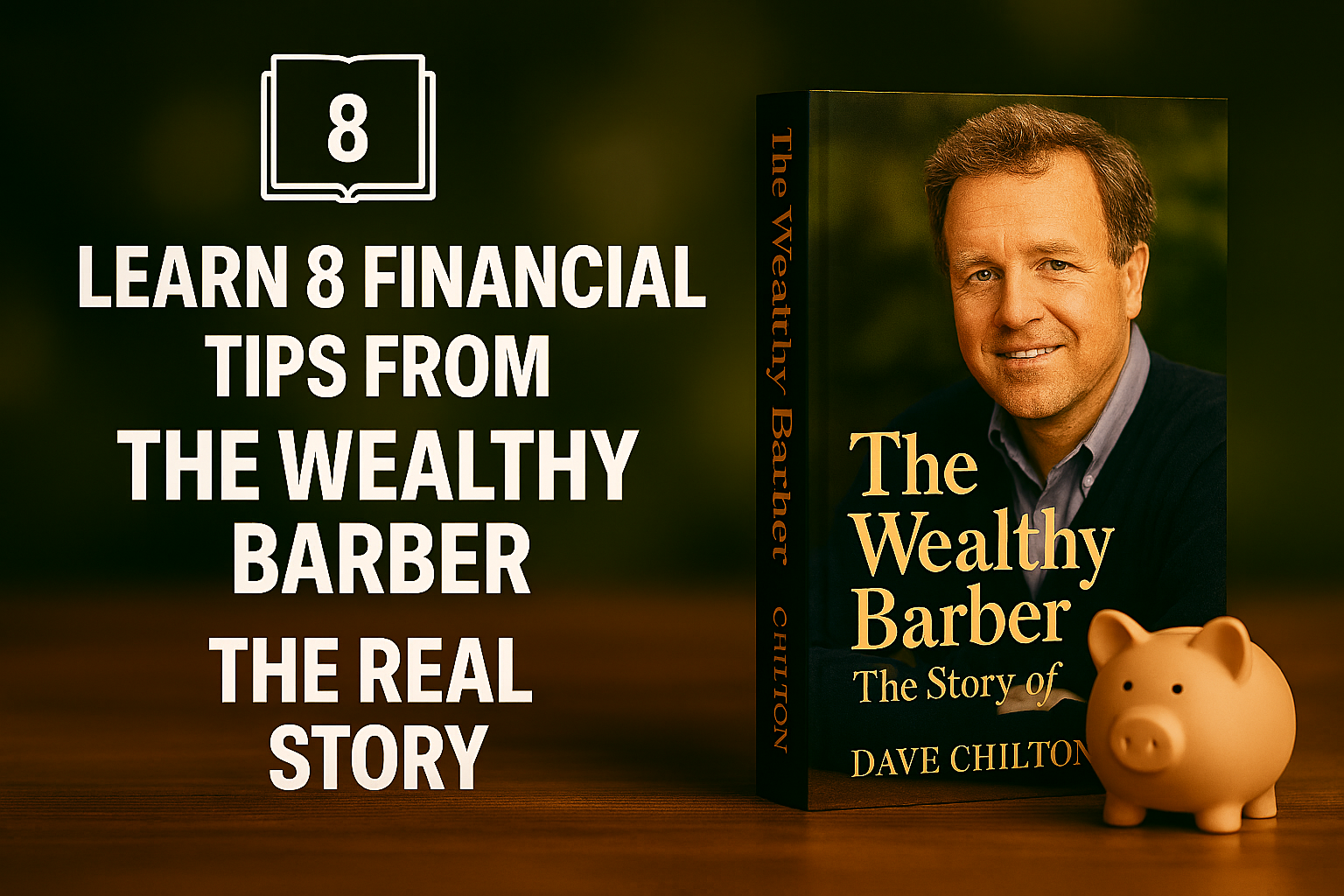
Ever wonder why some people, despite having ordinary salaries, manage to build long-term financial security while others, although having higher incomes, struggle? Many people think that having a lot of money or being lucky are the only ways to be wealthy. However, the reality is different; modest, dependable routines are where the true magic of money is found. In his best-selling book The Wealthy Barber, David Chilton provides a lovely explanation of this. It's a straightforward tale in which a barber—an average man—teaches timeless wealth-building principles; it's not a dry financial textbook. We'll dissect the book's "8 financial tips" in this blog, which, if followed seriously, have the power to drastically change your life. Every tip seems like revealing a secret—something obvious but capable of influencing your destiny. By the end, you will have a renewed sense of confidence regarding your financial journey in addition to understanding why this book is regarded as a classic.
Paying bills, EMIs, and expenses first, then saving "whatever is left," is the largest error most individuals do. However, the issue is There is never anything left. "Save first, spend later" is the golden guideline that David Chilton highlights. A portion of the money should be set aside for your future as soon as it enters your account. Consider it like sowing seeds. There won't be any seeds left to plant if you wait until all the eating is finished. However, those seeds gradually grow into something substantial if you regularly set aside even 10% to 15% of your income before spending the remainder. Here's a useful tip: configure an automatic transfer so that a portion of your paycheck is transferred to an investing or savings account as soon as it arrives. Over time, you'll accumulate a financial cushion that gives you a sense of calm certainty, but you won't even notice it's gone. It's more about attitude than money when it comes to paying yourself first.
Because they ask themselves, "What difference will this little amount make?" many people disregard small saves. Compound interest, according to Chilton, is a miracle that gradually transforms small, consistent inputs into enormous wealth. For instance, investing just $70 a month at a 10% annual return might grow to about $150,000 in 30 years. If you extend it to 40 years, you'll be looking at more than $400,000. The key component is time. However, most individuals put things off. They believe they have plenty of time because they are in their 20s. They prioritize loan repayment in their 30s. They discover they've lost decades when they're in their 40s. In the long run, every year of delay costs you a lot. The rule is straightforward: begin small, begin early, but begin now.
Bad debt is one of wealth's greatest adversaries. Lifestyle EMIs, personal loans, and credit cards may seem innocuous at first, but they can quickly turn into money pits. According to Chilton, debt, particularly high-interest debt, can stealthily destroy all you've worked so hard to achieve. Loans aren't always terrible. An education loan or a home loan may be a wise investment for your future. But using your card to pay for electronics, trips, or changes to your way of life? Such debt robs the freedom of tomorrow for the fleeting pleasure of now. Paying off high-interest debt as soon as possible is a straightforward yet effective first step.
For instance, no investment can beat the losses you're accruing if your credit card charges you 30% a year. It would be like receiving a 30% return if you paid off that debt. The phrase "Earn interest, don't pay it" should stick in your memory. Your chances of accumulating real wealth increase with the speed at which you transition from debtor to investor.
The majority of people in today's world allow their income to increase along with their lifestyle. A larger salary translates into a more luxurious apartment, a more costly phone, and a larger car. This cycle never stops. Consider a scenario in which one individual makes $5,000 per month and spends it all, while the other makes $3,000 but only spends $2,200. Despite making less money, the second individual is strengthening their financial base. The contradiction that most people overlook is that. Being purposeful rather than stingy is what it means to live below your means. It's about avoiding pointless "upgrades" that don't genuinely make you happier. You can accelerate your path to independence by delaying that new automobile, avoiding the incessant phone upgrades, or bucking the need to "keep up with the neighbors." Margin creates wealth, and simplicity creates margin. And you can only make those decisions once you quit trying to please other people and begin making plans for yourself.
Although keeping money in a fixed deposit or savings account may seem secure, inflation gradually reduces its value. Chilton underscores the necessity of putting your money to work through investments—stocks, mutual funds, bonds, or retirement accounts. Yes, investing can be daunting. However, the dangers significantly decrease when you diversify and have a long-term perspective. Consistent, astute investing may make even the most common person, like a barber, wealthy. The harsh truth is that $10,000 will lose value due to inflation if it is kept in a bank account for 20 years. In the same time frame, however, the same $10,000 invested in an index fund with an annual growth rate of 10% might more than double. The decision is straightforward: would you like to labor like a worker who never takes a break or let your money sleep? Wealthy individuals always chose the latter.
Because insurance seems pointless or dull, most individuals disregard it. However, according to Chilton, insurance serves as the safety net that guards everything else you've put a lot of effort into creating. That is avoided by insurance. Life insurance makes sure that your family's finances won't fall apart in the event that you pass away. Your funds and investments are still at risk in the absence of these. Chilton raises a crucial point: don't mistake insurance for investment. For security, choose for straightforward, affordable term insurance as opposed to complex plans that offer little in the way of benefits.
Insurance ought to serve as a safeguard rather than a business venture. Consider it this way: constructing a fortress without walls is analogous to financial planning without insurance. You may purchase protection and peace of mind for your family's future with insurance.
Most people believe that in their 50s, retirement is something to be concerned about. "The earlier you plan, the less you have to worry later," Chilton maintains. Consider this scenario: if you begin investing at age 25 and make $100 a month at a 10% rate, you may have around $600,000 by the time you are 60. However, you will need to invest four times as much each month simply to catch up if you wait until you are forty to begin. Early planning makes retirement a decision rather than a burden. You won't have to quit your job because of your health; you'll be able to do so whenever you choose. The sacrifices you make now will be appreciated by your future self. Age is not a factor in retirement. It all comes down to being financially independent and living your life as you see fit. And from now on, you are the only one who can offer yourself that gift.
Chilton concludes by emphasizing the importance of giving. True fulfillment comes from using your money to help others, whether it be through charitable giving, family support, or community service. Wealth isn't simply about accumulating things. Giving fosters balance and thankfulness. It keeps prosperity from becoming avaricious. Additionally, because you learn to handle your money consciously rather than allowing it to rule you, it practically teaches you to respect it. However, it gives purpose when you witness your riches making a difference in someone else's life. The cycle of wealth is completed via contribution rather than consumption. True wealth is determined by what you contribute rather than what you own.
As The Wealthy Barber reminds us, not only high-earning professionals or Wall Street gurus may achieve financial success. By adhering to these eight principles—pay yourself first, use compound interest, manage debt, live within your means, invest sensibly, get insurance, save for retirement, and give back—even a barber—an average man—can become wealthy. Your task is straightforward: will you use these in your own life? The foundation of financial independence is made up of bricks, each of which is a tiny habit. Start now by paying off a debt, opening an investing account, or establishing an automatic savings account. It's not just about money; it's also about independence, discipline, and lifestyle. Build money instead than merely thinking about it. Your financial independence is just around the corner. Make the initial move.

Imagine this While enjoying coffee at a café, your twenty-five-year-old acquaintance remarks ...
 Tajib Ali
Tajib Ali
Your twenties are a time of freedom. You fantasize of creating the finest life possible after ...
 Tajib Ali
Tajib Ali
Imagine waking up in the morning, brewing a cup of coffee, checking your phone, and seeing that your...
 Tajib Ali
Tajib Ali.png)
We frequently hear financial advice and assume that saving money is merely a habit that takes time a...
 Tajib Ali
Tajib Ali.png)
Have you ever wondered how the most important financial choices are made in the world? Michael Lew...
 Tajib Ali
Tajib Ali.png)
One of those financial instruments that can simultaneously offer you freedom and risk is a credit ca...
 Tajib Ali
Tajib Ali.png)
However, the majority believe his tactics are exclusive to Wall Street gurus or billionaires. ...
 Tajib Ali
Tajib Ali.png)
Imagine, brothers and sisters, that you have earned a college degree and are free of student loan de...
 Tajib Ali
Tajib Ali
Imagine this: Your graduation cap has just been thrown into the air. Your degree is your...
 Tajib Ali
Tajib Ali
Comments (0)
Leave a Comment